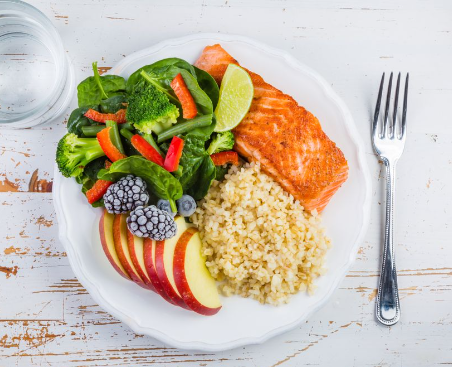5 Ways to Stop Overeating and Drop Weight
Introduction
In the pursuit of weight loss, overcoming overeating is a crucial challenge that many individuals face. This comprehensive guide explores five detailed strategies, incorporating both psychological and practical approaches, to help you curb overeating and achieve lasting weight loss.
1. Practice Mindful Eating

Slow Down
In the fast-paced world we live in, meals are often rushed, and we may not give our bodies the chance to signal fullness. By slowing down and savoring each bite, you allow the physiological process of satiety to catch up with your eating pace. Put your utensils down between bites, chew your food thoroughly, and engage your senses in the eating experience.
Pay Attention
Eating mindfully entails paying attention to your body’s signals of hunger and fullness. Before reaching for a snack, ask yourself if you are genuinely hungry or if there’s an emotional trigger prompting the desire to eat. When you’re hungry, eat, and when you’re content, stop. Minimize distractions during meals, such as watching TV or using electronic devices, to enhance awareness and prevent mindless overeating.
2. Portion Control

Use Smaller Plates
Your perception of portion sizes may be influenced by the size of your plate. Utilizing smaller plates tricks your mind into feeling satisfied with less food. This psychological strategy can be a powerful tool in controlling portion sizes without feeling deprived.
Pre-Portion Snacks
Snacking mindlessly from a large bag can lead to unintentional overeating. Combat this by pre-portioning snacks into smaller containers. This not only helps with portion control but also provides a clear visual cue of how much you’re consuming, making it easier to manage calorie intake.
High-Intensity Interval Training (HIIT) has gained immense popularity for its effectiveness in torching calories and promoting weight loss. This fat-burning exercise interval workout combines bursts of intense activity with short periods of rest, creating a powerful metabolic boost. If you’re ready to elevate your fitness routine and shed some pounds, give this HIIT weight-loss workout a try.
3. Stay Hydrated
Drink Water Before Meals
Hydration plays a crucial role in regulating appetite .You can feel fuller and be less likely to overeat if you have a glass of water before meals. Additionally, thirst can sometimes be mistaken for hunger, making it essential to stay adequately hydrated throughout the day.
Choose Water Over Sugary Drinks
Opting for water instead of sugary beverages is a simple yet effective way to cut down on empty calories. Sugary drinks can contribute to excessive calorie intake without providing the same satiety as whole foods. Make water your primary beverage to support overall health and weight management.
4. Plan and Prepare Meals
Meal Prep
Planning and preparing meals in advance give you greater control over the ingredients and portion sizes. By cooking at home, you can make healthier choices and avoid the hidden calories often found in restaurant or takeout meals. Consider dedicating a day to meal prep to set yourself up for success throughout the week.
Snack Smart
Keep healthy snacks readily available to avoid succumbing to unhealthy options when hunger strikes between meals. Pre-cut vegetables, fresh fruit, or a handful of nuts are convenient and nutritious choices that can help you make positive dietary decisions.
Smart food choices form the foundation of a healthier lifestyle. By making informed swaps, you can optimize your nutrition, manage calorie intake, and support your body’s well-being.
5. Emotional Eating Awareness
Identify Triggers
Emotional eating is a common cause of overeating. Identifying the triggers that lead to emotional eating is the first step in breaking this cycle. Stress, boredom, sadness, and even happiness can prompt overindulgence. Develop alternative coping mechanisms such as going for a walk, practicing deep breathing, or engaging in a favorite hobby.
Keep a Food Journal
Maintaining a food journal can be a powerful tool in understanding your eating habits. Record not only what you eat but also when and why. This practice helps reveal patterns, making it easier to pinpoint areas for improvement and make conscious choices about your food intake.
Conclusion
In conclusion, overcoming overeating requires a multifaceted approach that addresses both the physical and psychological aspects of eating behavior. By incorporating mindful eating, practicing portion control, staying hydrated, planning and preparing meals, and being aware of emotional eating triggers, you can develop a sustainable strategy for weight loss. Remember that individual responses to these strategies may vary, and it’s advisable to seek guidance from healthcare professionals or registered dietitians for personalized advice on your weight loss journey. Commit to these changes, and over time, you’ll find yourself not only shedding excess weight but also adopting a healthier and more mindful approach to eating.






